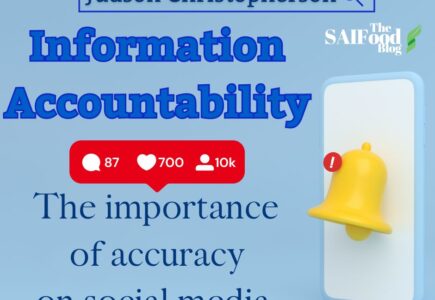Misinformation & Disinformation
Misinformation is defined as incorrect statements or falsehoods – being excusably mistaken in what one views as factual. Its more cynical sidekick, disinformation, is the intentional dissemination of misrepresentations – inexcusably fabricating facts to support a narrative or create disruption.
Both forms of falsehood pose a direct threat to the ability to advance societal well-being through the diffusion of scientific research and social media is exacerbating the issue to a great degree. One post containing disinformation can mislead readers, enabling the mass spread of the falsehood through misinformed social media uses. For example, misinformation detailing the bankruptcy of United Airlines generated a 76% drop in the company’s share price in mere minutes. Nearly 90% of Canadians are active on social media and the spread of misinformation and disinformation remains largely untraced, lacking any accountability standards, such as those that exist for tangible products.
In the marketing of food products, regulations, monitoring, and accountability systems ensure consumers access fair information. To ensure fair competition between goods, nutrition labels must not overstate the quantities of beneficial nutrients (e.g., protein or fibre) or understate the presence of harmful ones (sugar or trans fat) to ensure consumers are not disinformed. Additionally, safety labelling to ensure those with gluten or peanut allergies do not consume products that may be detrimental to their health. In Canada, companies that divert from the stringent food labelling criteria detailed above are subject harsh penalties. On the contrary, labels detailing credence attributes are designed to ensure products are not marketed as carbon neutral, GMO free, or organic without having passed regulation to be certified as such. However, it must be noted that these markets are subject to fraudulent behaviour without accountability, similar to social media.
On social media, both misinformation and disinformation are prominent and powerful tools to mislead the public on a myriad of topics. Ranging from conspiracy theories to DeepFake synthetic media impersonating humans to a degree that is indistinguishable at first glance, the opportunity to spread disruptive false narratives via social platforms is growing at an alarming rate. In an agricultural context, falsehoods surrounding GMOs, environmental impacts, animal welfare, and consumer health impacts pose a significant threat to the economic prosperity of all agricultural sectors. In academic, journalistic, and political realms the objective is to provide the public with accurate information and safeguards have been implemented over time to ensure that high standards are consistently met. It’s time social media followed suit.
Agricultural Disconnect
As the number of Canadians directly involved in a farm or ranch declined from 7.1% in 1971 to 1.6% in 2021, the disconnect between consumers and the principal point of food production is an increasing concern for farmers and policymakers. For every farmer that exits the industry many consumers lose their direct connection to agriculture, with only 3% of Canadians having direct connection to a farm in 2017. Canadian consumers place a high level of trust in farmers to disseminate information surrounding the safety of food products. However, misinformation, disinformation, or the impersonation of farmers on social media poses a significant threat to society about the production of safe, nutritious food. Compounding this issue is the recent Canadian news ban imposed by social media platforms under the Meta framework, that may be extended to the Google search engine in the coming months. Under this ban, producers, academics, students, and media members are unable to share relevant information from reputable news sources to large audiences in a timely manner.
Misinformation and Disinformation Accountability
In the vast collections of memes, recipes, and family photos that comprise our social media feeds, digging malicious and fictitious content out of relevant material is not an easy task. Rapid advances in machine learning have enabled computers to filter out nearly 90% of fake news. However, merely filtering falsehoods out of our timelines is not enough. Substantive steps must be taken to verify the credibility and accuracy of social media content. Those who generate and spread disinformation should be filtered out, similar to how they would be in a food supply chain.
An initial step that could be taken is shadow notifications attached to malicious users’ posts. This notifies the viewers, but not the poster, that a given user commonly spreads disinformation and the material may not be credible. However, the concern surrounding automated accounts, better known as bots, intensifies the spread of misinformation to a great degree. In the context of misinformation, bot accounts are extremely prominent on social media, comprising one third of all misinformation retweets. Frequently, bot accounts repost stories mere seconds after their original posting, enabling misinformation to go viral in a matter of minutes. To combat the rapid spread, topics should be flagged as prone to misinformation, prompting further review from autonomous disinformation filters (i.e. if certain keywords are present) prior to the post being available for viewing. At the current rate of technology, this would take mere seconds.
Obviously, a vast number of workarounds are available to those who wish to spread falsehoods with malicious intent, and no notification or filtration system will ever stop that. However, it may slow and lessen the spread substantially, especially if reposts are subject to the same scrutiny. As consumers of both social media and food products, we need to increase our awareness of disinformation.
By banning all news links within their platforms in mere weeks, social media companies displayed the power they can exert in controlling content on their platforms. This raises the question, why are the safeguards monitoring misinformation and ensuring accountability so weak? This question may appear unfair to some, as prolific instances such as the 2021 ban of Donald Trump from social media or ban of Robert F. Kennedy Jr. in the same year. It appears social media holds political figures accountable; however, this is not enough to ensure society can function efficiently, free from the weight of a misinformed public.


